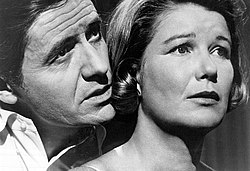| CBS Playhouse | |
|---|---|
 | |
| Genre | Anthology drama |
| Written by | Ron Cowen Robert J. Crean Earl Hamner Loring Mandel JP Miller Tad Mosel Ronald Ribman Reginald Rose Ellen M. Violet |
| Directed by | Paul Bogart Richard Butler William A. Graham David Greene Delbert Mann George Schaefer |
| Theme music composer | Aaron Copland |
| Country of origin | United States |
| Original language | English |
| No. of seasons | 3 |
| No. of episodes | 12 |
| Production | |
| Executive producer | Barbara Schultz |
| Camera setup | Single-camera |
| Running time | 90 minutes |
| Original release | |
| Network | CBS |
| Release | January 29, 1967 – February 10, 1970 |
CBS Playhouse is an American anthology drama television series that aired on CBS from 1967 to 1970. Airing twelve plays over the course of its run, the series won ten Primetime Emmy Awards and featured many noteworthy actors and playwrights.